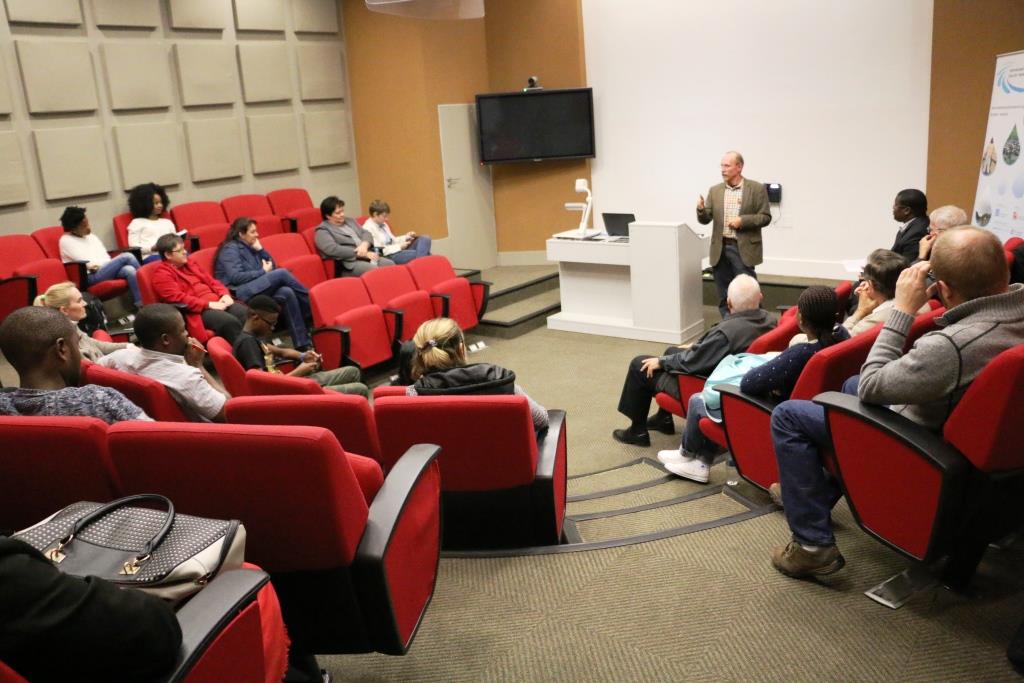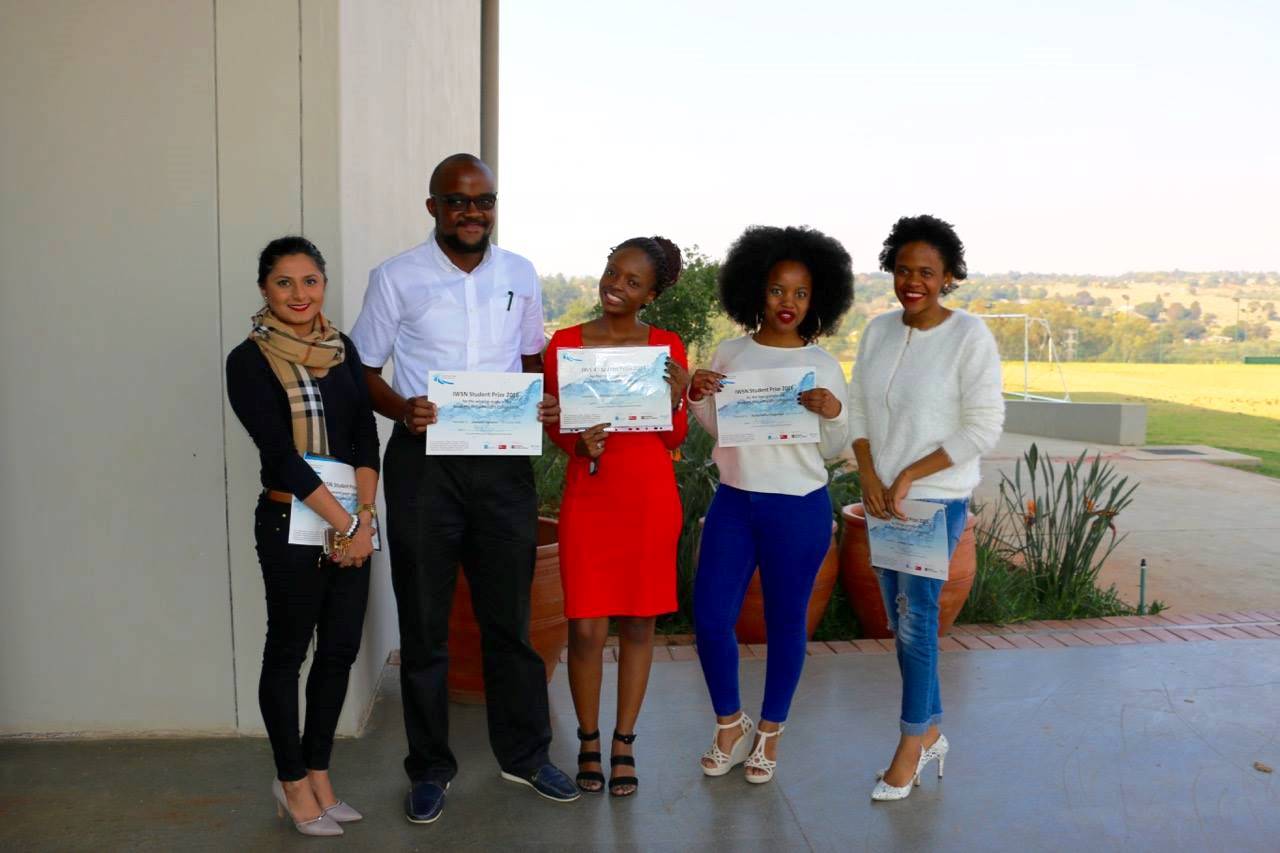 On Friday 3 June, Monash South Africa, in partnership with the International Water Security Network, hosted a seminar which brought together academics, practitioners and both undergraduate and postgraduate scholars to engage in a dialogue around drought. Currently, drought is a highly topical issue for the southern African region, and the event included both the sharing of personal experiences and the exploration of possible long term mitigation strategies. It also served as the platform on which to award the IWSN undergraduate student prizes.
On Friday 3 June, Monash South Africa, in partnership with the International Water Security Network, hosted a seminar which brought together academics, practitioners and both undergraduate and postgraduate scholars to engage in a dialogue around drought. Currently, drought is a highly topical issue for the southern African region, and the event included both the sharing of personal experiences and the exploration of possible long term mitigation strategies. It also served as the platform on which to award the IWSN undergraduate student prizes.
Dr Jim Taylor, Director of Environmental Education at the Wildlife and Environment Society for South Africa (WESSA) delivered the keynote address in which he unpacked several water related environmental issues in the KwaZulu Natal region of South Africa. He related drought and its impacts to a scenario he called “slow violence” which he dramatically contrasted to the recent European terror attacks in Paris and Brussels (“quick violence”) – events which received quick and efficient coverage and responses. He ended by proposing a comprehensive framework for action research approaches leading to long term sustainable water management, and encouraged the students in attendance to become global change leaders.
With the stage set, five undergraduate students delivered short presentations based on an essay/poster writing competition they had entered. The competition asked students to reflect on the drought in southern Africa and how this had directly impacted upon them and what actions they had taken. Samuel Ngaira, who won the essay writing competition, recalled a morning at his home in Pretoria:
“As I opened the kitchen tap, I was met by a blank stare; the only thing that came out of it was a release of pressure and maybe three drops of water. Thus it dawned on me that I was going to eat what they call ‘air burgers’. The previous night I had made a filling meal of pap and beef and had filled the pot with water for the ease of washing in the morning, but that was not to be the plan. I quickly divided up the water in the pot and allocated a portion for the three course breakfast I deserved, lunch and dinner.”
Second runner up Zahra Kaba, a Muslim student who suffers with obsessive compulsive disorder, explained how the unreliable supply because of the water restrictions in the drought affected her:
“I trust that I can tolerate some prolonged power cuts here and there, but since I suffer from obsessive compulsive disorder, if you tell me that I cannot flush my toilet, or must restrict myself when I can wash my hands or shower; my heart immediately begins to race irregularly. As a Muslim, I have to pray five times a day (5am, 12pm, 3pm, 5pm and 7pm), however, prior to that it is mandatory to wash myself to be clean. As I would go for a quick shower before prayers, frequently my anger and pressure would rise after turning the knob to realise that the water supply has been cut off.”
It was not only the students themselves who felt the direct impacts of water restrictions – Hlobisile Moshaba shared the story of her father, a maize farmer in the agricultural belt of Gauteng province in South Africa:
“Imagine watching your passion and your lifetime investment being destroyed right in front of your eyes. I watched my father stay positive, fighting to save his dream of running a successful farm. Due to the drought there was poor economic growth and many lost their jobs, as we could not afford to pay the workers anymore. What we experienced was nothing compared to smaller farmers because a neighbouring farm had lost 15 hectares of land to drought and was basically left with nothing. I remember at one point my dad was forced to auction his livestock in order to feed our family. Farmers were running at a loss and their debt was mounting.”

Moshaba (2nd place essay), Buhlebethu Magwaza and Awande Duma (Winning Poster)
But it was not all doom and gloom, as students were also asked to make suggestions of what others in society could do during the drought period. Two students, Buhlebethu Magwaza and Awande Duma, dedicated their poster presentation to mitigation options that the country could employ in dealing with drought in the future. Their poster called for collective action amongst local, regional and national civil society, businesses and government, stating that everyone has a role to play. Zahra also suggested that:
“Instead of pointing fingers at each other, the success of the recuperation strategy demands pulling collectively as a team now more than ever. It demands all households contribute by obeying the water restrictions.”
Buhlebethu and Awande then paid particular attention to the bettering of local and national management of water resources, transboundary water sharing and a future insurance policy in which the government should set aside money for future drought impacts.
At the end of the seminar, Associate Professor Bimo Nkhata, the IWSN Africa project manager, together with the acting head of the School of Social Science, Associate Professor Rika Swanzen, awarded prizes to the top three student essays and top student poster. The winning essay received R3000 cash and went to Samuel Ngaira, the runner up was Hlobisile Moshaba and Zahra Kaba was third. Buhlebethu Magwaza and Awande Duma co-authored the winning poster and shared the winnings from this. The students reflected that they really enjoyed taking part in the essay/poster competition because the topic was really close to their hearts and they valued the opportunity to share their experience with a small community of practitioners also interested in drought in southern Africa.
